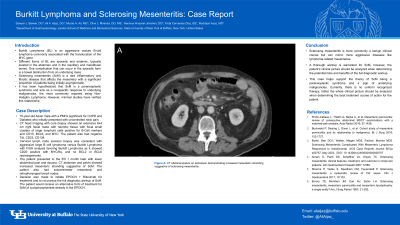Sunday Poster Session
Category: Small Intestine
P1337 - Burkitt Lymphoma and Sclerosing Mesenteritis: Case Report
Sunday, October 22, 2023
3:30 PM - 7:00 PM PT
Location: Exhibit Hall

Has Audio
- AA
Ali A. Aijaz, DO
University at Buffalo
Buffalo, NY
Presenting Author(s)
Sawyer J. Bawek, DO, Ali A.. Aijaz, DO, Murad H. Ali, MD, Clive J. Miranda, DO, MS, Nariman Hossein-Javaheri, DO, Frida Cervantes Diaz, BS, Muddasir Ayaz, MD
University at Buffalo, Buffalo, NY
Introduction: Burkitt Lymphoma (BL) is an aggressive mature B-cell lymphoma commonly associated with the translocation of the MYC gene. Different forms of BL are sporadic and endemic, typically located in the abdomen and in the maxillary and mandibular bones. One complication that can occur in the sporadic form is a bowel obstruction from an underlying mass. Sclerosing mesenteritis (ScM) is a rare inflammatory and fibrotic disease that affects the mesentery with a significant proportion of patients being initially asymptomatic. It has been hypothesized that ScM is a paraneoplastic syndrome and acts as a nonspecific response to underlying malignancies with the most commonly reported being Non-Hodgkin Lymphoma. However, minimal studies have verified this relationship.
Case Description/Methods: 75-year-old Asian male with a PMHx significant for COPD and Diabetes who initially presented with uncontrolled neck pain. CT head imaging with core biopsy showed an extensive 6x4 cm right facial mass with necrotic tissue with focal small clusters of large lymphoid cells positive for B-Cell markers and CD10, BCL6, and MYC. The patient also had negative Tdt, CD23, CD138. Cervical lymph node excision biopsy was consistent with aggressive large B cell lymphoma versus Burkitt Lymphoma with FISH analysis favoring Burkitt Lymphoma as it showed CD20 positive with MYC/8q, and no BCL2 or BCL6 rearrangements.
The patient presented to the ED 1 month later with lower abdominal pain and dysuria. CT abdomen and pelvis showed increased mesenteric stranding suggestive of ScM. The patient also had subcentimeter mesenteric and retropharyngeal lymph nodes.
Decision was made to initiate EPOCH + Rituximab for treatment and to not pursue the full diagnostic workup of ScM. The patient would receive an alternative form of treatment for ScM of cyclophosphamide already in the EPOCH.
Discussion: Sclerosing mesenteritis is more commonly a benign clinical course but can mimic more aggressive diseases like lymphoma-related mesenteries. A thorough workup is warranted for ScM, however, the patient's clinical picture should be analyzed when determining the potential risks and benefits of the full diagnostic workup. This case helps support the theory of ScM being a paraneoplastic syndrome and a sign of underlying malignancies. Currently, there is no uniform recognized therapy, rather the whole clinical picture should be analyzed when determining the best treatment course of action for the patient.
Disclosures:
Sawyer J. Bawek, DO, Ali A.. Aijaz, DO, Murad H. Ali, MD, Clive J. Miranda, DO, MS, Nariman Hossein-Javaheri, DO, Frida Cervantes Diaz, BS, Muddasir Ayaz, MD. P1337 - Burkitt Lymphoma and Sclerosing Mesenteritis: Case Report, ACG 2023 Annual Scientific Meeting Abstracts. Vancouver, BC, Canada: American College of Gastroenterology.
University at Buffalo, Buffalo, NY
Introduction: Burkitt Lymphoma (BL) is an aggressive mature B-cell lymphoma commonly associated with the translocation of the MYC gene. Different forms of BL are sporadic and endemic, typically located in the abdomen and in the maxillary and mandibular bones. One complication that can occur in the sporadic form is a bowel obstruction from an underlying mass. Sclerosing mesenteritis (ScM) is a rare inflammatory and fibrotic disease that affects the mesentery with a significant proportion of patients being initially asymptomatic. It has been hypothesized that ScM is a paraneoplastic syndrome and acts as a nonspecific response to underlying malignancies with the most commonly reported being Non-Hodgkin Lymphoma. However, minimal studies have verified this relationship.
Case Description/Methods: 75-year-old Asian male with a PMHx significant for COPD and Diabetes who initially presented with uncontrolled neck pain. CT head imaging with core biopsy showed an extensive 6x4 cm right facial mass with necrotic tissue with focal small clusters of large lymphoid cells positive for B-Cell markers and CD10, BCL6, and MYC. The patient also had negative Tdt, CD23, CD138. Cervical lymph node excision biopsy was consistent with aggressive large B cell lymphoma versus Burkitt Lymphoma with FISH analysis favoring Burkitt Lymphoma as it showed CD20 positive with MYC/8q, and no BCL2 or BCL6 rearrangements.
The patient presented to the ED 1 month later with lower abdominal pain and dysuria. CT abdomen and pelvis showed increased mesenteric stranding suggestive of ScM. The patient also had subcentimeter mesenteric and retropharyngeal lymph nodes.
Decision was made to initiate EPOCH + Rituximab for treatment and to not pursue the full diagnostic workup of ScM. The patient would receive an alternative form of treatment for ScM of cyclophosphamide already in the EPOCH.
Discussion: Sclerosing mesenteritis is more commonly a benign clinical course but can mimic more aggressive diseases like lymphoma-related mesenteries. A thorough workup is warranted for ScM, however, the patient's clinical picture should be analyzed when determining the potential risks and benefits of the full diagnostic workup. This case helps support the theory of ScM being a paraneoplastic syndrome and a sign of underlying malignancies. Currently, there is no uniform recognized therapy, rather the whole clinical picture should be analyzed when determining the best treatment course of action for the patient.
Disclosures:
Sawyer Bawek indicated no relevant financial relationships.
Ali Aijaz indicated no relevant financial relationships.
Murad Ali indicated no relevant financial relationships.
Clive Miranda indicated no relevant financial relationships.
Nariman Hossein-Javaheri indicated no relevant financial relationships.
Frida Cervantes Diaz indicated no relevant financial relationships.
Muddasir Ayaz indicated no relevant financial relationships.
Sawyer J. Bawek, DO, Ali A.. Aijaz, DO, Murad H. Ali, MD, Clive J. Miranda, DO, MS, Nariman Hossein-Javaheri, DO, Frida Cervantes Diaz, BS, Muddasir Ayaz, MD. P1337 - Burkitt Lymphoma and Sclerosing Mesenteritis: Case Report, ACG 2023 Annual Scientific Meeting Abstracts. Vancouver, BC, Canada: American College of Gastroenterology.
